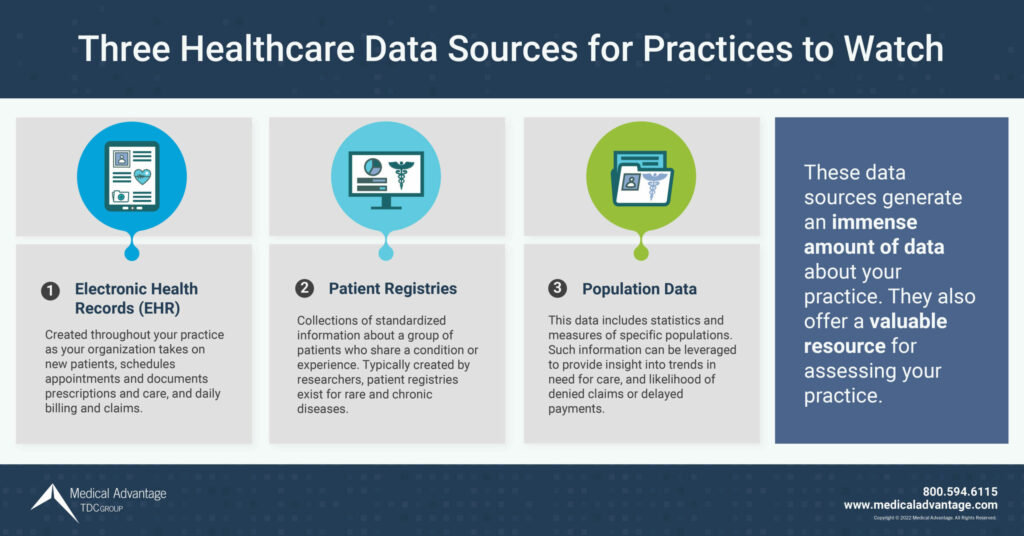Medical practices generate and work with a great deal of data in the daily course of operations. All that information creates a full picture of how the practice is performing — both on the business end and patient care outcomes. In short, medical practices with the right analytics will make better informed decisions and are equipped to get better returns on investment.

Examples of Primary Data Sources in Healthcare are data driven. From determining if more staff can be added, to if thresholds are being met for preventative care, so many decisions and outcomes depend on the proper use of data. To help maintain an efficient operation, all practice managers should be analyzing data from these three core healthcare data sources:
- EHR data – Electronic health records (EHRs) are created as a practice takes on new patients, schedules appointments, and documents prescriptions and care. This data is also generated from daily financial operations, billing, claims, and insurance records. Administrative data, including demographics, progress notes, patient problems, medications, vital signs, past medical history, immunizations, laboratory data and radiology reports all constitute EHR data.
- Patient registries – Patient registries are collections of standardized information about a group of patients who share a condition or experience. Typically created by researchers, patient registries exist for various diseases, both rare and chronic, including cancer, diabetes, cystic fibrosis, acute coronary syndrome, and arthritis.
- Patient population data – Population health data includes statistics, measures, and indicators of the state of and influences on the health of a specific population. Such information can be leveraged to provide insight into trends in need for care, and likelihood of denied claims or delayed payments.
These three basic data sets are foundational, but it is likely that you would include integration of other streams into your analytics depending on your practice needs.
The Importance of Analyzing Your Practice Healthcare Data
These healthcare data sources generate an immense amount of data about finances, patients, type of care provided, and the conditions and problems patients are seeking help with, to name a few. They also generate valuable insights for practice managers or anyone needing to assess the business end of a practice, such as a healthcare analytics consultant.
Using analytics in healthcare can help management determine if the practice is attracting enough patients to keep the business running, what type of care is most in demand, and whether staff and resources can currently provide the care their community needs.
Healthcare data analytics also can predict:
- Which patients are most likely to adhere to their medication prescription(s)
- When patients are due for screenings that will require more office visits
- Whether claims are likely to be rejected by a particular insurance provider
- Potential staffing shortages
Healthcare analytics can spot patterns that tend to lead to worse outcomes, and vice versa, allowing preventive interventions to maximize better care outcomes, including:
- Clinical data analytics to inform research and support disease prevention
- Eliminating unnecessary doctor visits and improving health outcomes by assessing past and current medical records
- Operational insights from scheduling, billing, and revenue data
EHR Data Analysis
Your EHR is the epicenter of your practice, comprised of all the examples of primary data sources in healthcare. As mentioned earlier, health data sources provide everything necessary to keep accurate records for patient care and progress.
This data can be used for various medical records analytics including:
- Clinical decision support
- Population health reporting
- Reduction of medical errors
EHRs also help to make health information more accessible, limit test duplication, reduce treatment delays, and support quality management.
Medical billing in the EHR documents and categorizes claims, then processes and tracks payments. Revenue cycle management (RCM) systems record how revenue is generated at a practice from the appointment all the way to the final payment. Those records may entail patient registration, patient’s personal information, and the patient’s primary insurance provider.
A practice can sustain revenue by leveraging analytics to capture the number of claims that require additional work to secure payment. Analytics can also account for the types of rejections and denials, illuminate upon the potential causes, and show trends for each. With the causes of denied and delayed claims at hand, practice operations can steer away from known roadblocks, and toward more certain, prosperous revenue paths.
Patient Registries and Population Data
Secondary data sources in healthcare – including population health data and patient registries – can offer numerous opportunities for practices, but also for current and future patients. Patient registries are effective in accounting for which demographics with certain conditions and diseases may be left out of key preventative care. Such platforms will also provide a wealth of information on the type of care that may be in demand among underserved patient populations.
If the registry includes your area of specialty, you can join the community to better understand therapeutic approaches regarding your patient population groups. You can also gain tools that are helpful for referring your own patients to a specialist. In addition, you can connect with like-minded physicians who share their care and treatment insights.
Examples of secondary data sources in healthcare include population health data that can provide insights such as who may be seeking out prenatal care or family planning or help to predict which patients are likely to be diagnosed with hypertension or diabetes. These prognostics inform the practice’s planning for both resources and personnel.
Physicians can use population health data collection to predict which factors influence certain demographic groups to seek treatment, such as proactive care against diabetes, including screenings and weight loss plans. Regarding our senior population, healthcare analytics also can help predict who is more likely – according to age and medical history – to be a fall risk.
Make Critical Decisions with Confidence Through Healthcare Analytics
How would an automated healthcare reporting dashboard solution help your organization? Medical Advantage can help. Our medical practice service’s healthcare dashboards are designed to provide the insights necessary to make sound strategic decisions that ultimately improve care quality, and boost revenue.





